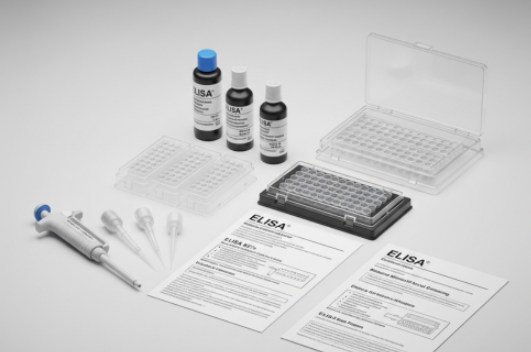Different Types Of ELISA Test Kits And Their Applications

Strong 8k brings an ultra-HD IPTV experience to your living room and your pocket.
ELISA or Enzyme-Linked Immunosorbent Assay is widely used in biomedical and diagnostic laboratories. Its ability to detect and quantify specific proteins, antibodies, hormones, and antigens with high sensitivity and accuracy made it an ideal tool for various research applications.
But, what exactly ELISA is?
It is a plate-based assay technique. It uses enzyme-linked antibodies and specific substrates to identify the presence and concentration of a target molecule in a sample.
The ELISA immunoassay kits work on the basis of antigen-antibody interactions. In this technique:
- It uses a 96-well or 384-well microplate that has an antibody attached to it. These antibodies show high affinity towards the specific antibody or antigen when added to it.
- After this, the plate is incubated to ensure proper antigen-antibody interactions.
- Now a block solution, usually a BSA or milk protein, is added to stop non-specific binding. This step helps reduce background noise and improves accuracy.
- Now the sample is added, which will bind to the coated molecule in the well, especially if the target antigen or antibody is present.
- The next step is to add an enzyme linked detection antibody that binds to the target molecule.
- Now a specific enzyme substrate is added that produces a measurable signal, usually a color change. This signal is proportional to the amount of target molecule in the sample.
- At the end, the microplate reader is used to measure the color intensity. The higher the color change intensity, the higher the target molecule present in the sample.
ELISA is known for its high sensitivity, specificity, and versatility. So, it is an ideal technique to diagnose diseases, monitor immune responses, detect allergens, and advance scientific research.
Types of ELISA Test Kits
There are 4 types of ELISA formats, categorized based on how the target molecule is detected and how the assay is constructed. Each format has its own pros and cons and is ideal for different applications.
ELISA formats include:
Direct ELISA
In direct ELISA, an antigen is directly attached to the surface of microwell plate and enzyme-linked antibody specific to the antigen is added. When a substrate is added, the enzyme catalyzes a reaction that produces a color change.
Pros
- Simple and quick procedure.
- Ideal for detecting targets, especially when present in high concentrations.
Cons
- Low sensitivity.
- No signal amplification is done.
Indirect ELISA
In indirect ELISA, both primary and secondary antibodies are used. In this, a secondary enzyme-linked antibody bind to the primary antibody specific to the target antigen.
Pros
- High sensitivity.
- Versatile and cost effective, especially when using the same secondary antibody for the detection of multiple primary antibodies.
Cons
- Complex procedure.
- High risk of cross-reactivity.
Sandwich ELISA
Sandwich ELISA uses two antibodies – a capture antibody bound to the plate and a detection antibody linked to an enzyme. In this ELISA format, the target antigen is “sandwiched” between these two antibodies.
Pros
- Highly specific and sensitive.
- Suitable for complex samples with low antigen concentrations.
Cons
- Requires well-characterized antibody pairs.
- More complex and time-consuming.
Competitive ELISA
In competitive ELISA, labeled antigen and sample antigen compete for binding sites on a limited amount of antibody. The lower the signal, the higher the concentration of the antigen in the sample.
Pros
- Useful for detecting small molecules.
- Effective for low-abundance targets.
Cons
- More difficult to optimize.
- Interpretation can be more complex.
Applications of ELISA Test Kits
ELISA kits are used in multiple applications, including:
1. Medical Diagnostics
ELISA is commonly used to diagnose various diseases by detecting specific antibodies or antigens in blood or other body fluids. For example, it can detect antibodies against viruses like HIV, hepatitis, and SARS-CoV-2.
2. Infectious Disease Detection
Public health laboratories rely on ELISA to detect bacterial and viral infections. It helps in identifying pathogens quickly and with high accuracy. This makes it essential during outbreaks and for surveillance programs.
3. Allergy Testing
ELISA can detect allergen-specific IgE antibodies in a patient's serum. This makes it a helpful tool in identifying allergies to foods, pollens, or environmental substances.
4. Cancer Biomarker Detection
Certain ELISA kits are designed to detect tumor markers such as CA-125 (ovarian cancer) or PSA (prostate cancer). These kits support early diagnosis, monitoring disease progression, and evaluating treatment response.
Choosing the Right ELISA Test Kit
With numerous ELISA kits available, selecting the right one depends on several factors:
- Target Analyte: Know whether you're detecting a protein, peptide, hormone, or antibody.
- Sensitivity and Specificity: Choose a kit that can detect low levels of the target with minimal cross-reactivity.
- Sample Type: Consider if your sample is serum, plasma, saliva, or tissue extract.
- Assay Time and Complexity: Shorter protocols are ideal for high-throughput labs, while more complex assays may offer greater accuracy.
- Compatibility with Lab Equipment: Check that the kit’s format suits your lab's microplate readers and other tools.
Conclusion
ELISA kits are widely used for various research applications. However, not all ELISA formats are ideal for all applications. So, understanding different types of ELISA formats and where to use them is the key to get reliable results for your research applications. In addition, you need to buy your ELISA test kits from reliable suppliers, like MyBioSource.
Note: IndiBlogHub features both user-submitted and editorial content. We do not verify third-party contributions. Read our Disclaimer and Privacy Policyfor details.







